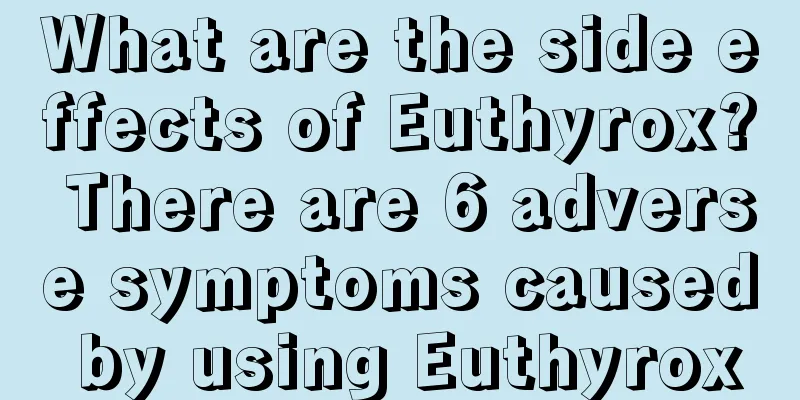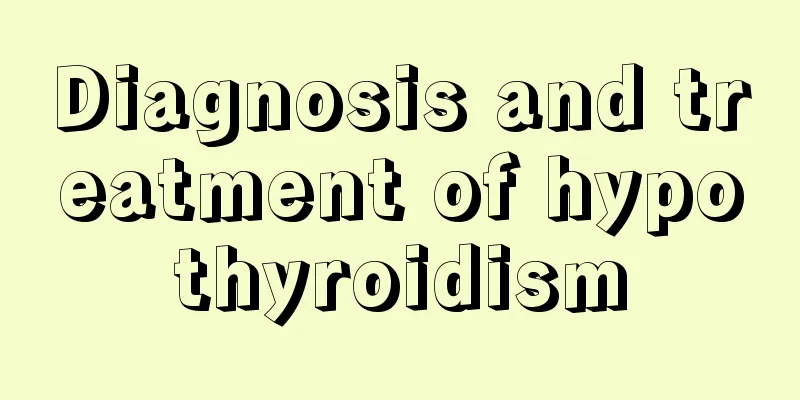What are the side effects of Euthyrox? There are 6 adverse symptoms caused by using Euthyrox

|
Euthyrox has many medicinal uses and is relatively effective. It is deeply loved by patients and friends and has always had good sales. If taken in large quantities for a long time, it will cause symptoms such as palpitations, insomnia, irritability, sweating, tremors (especially finger tremors), and hyperphagia. What are the side effects of Euthyrox? Let me tell you about it below. Side effects of Euthyrox 1. Gastrointestinal reactions, manifested as abdominal distension, vomiting, diarrhea or constipation, etc. 2. In terms of the heart, it can induce arrhythmia and cause palpitations and discomfort. For those with a history of coronary heart disease, it can induce angina pectoris or even myocardial infarction. Therefore, those who take the medicine for a long time need to regularly check the electrocardiogram and cardiac color ultrasound. 3. Overdose of Euthyrox may cause symptoms of hyperthyroidism such as excitement, palpitations, headache, insomnia, heat intolerance, sweating and even tremors. 4. Thyroid hormone has no adverse reactions if used in appropriate dosage. Excessive use may cause tachycardia, palpitations, angina pectoris, arrhythmia, headache, nervousness, excitement, restlessness, insomnia, skeletal muscle spasms, muscle weakness, tremor, sweating, flushing, heat intolerance, fever, diarrhea, vomiting, weight loss and other symptoms similar to hyperthyroidism. 5. When T3 is overdosed, adverse reactions occur faster than T4 or thyroid powder. Reducing the dosage or stopping the drug can make all symptoms disappear. In cases of T4 overdosage, symptoms disappear more slowly. The manifestations of adverse reactions are similar to those of hyperthyroidism, such as increased appetite, nervousness, various types of tachycardia, arrhythmia, and increased basal metabolism. In 1986, allergic reactions caused by pure thyroid preparations were first reported. Patients with hypothyroidism developed fever, abnormal liver function, and increased eosinophils. Generally, the symptoms disappeared after stopping the drug. 6. For children with hypothyroidism, T4 may cause short-term pseudoencephalopathy. If T4 treatment is used continuously, headaches and bilateral optic disc edema may occur even if there is no local neurological deficit. |
<<: How to prevent thyroid cancer? What are the methods to prevent thyroid cancer?
Recommend
Is it difficult to distinguish between liver islets and liver cancer?
These are two diseases that are easy to distingui...
What is the reason for underarm peeling
With the change of seasons, people find that thei...
What drugs can treat ovarian tumors
Ovarian tumor is a relatively serious disease, so...
Can donating blood lower blood pressure?
Blood donation is an activity that takes place ev...
Can trigeminal neuralgia heal itself?
Trigeminal neuralgia is very common in our lives,...
What are the causes of non-Hodgkin lymphoma?
Non-Hodgkin's lymphoma is a type of malignant...
Why does my mouth feel sour after eating
Food is particularly abundant nowadays, and we of...
Introduction of anti-ovarian cancer drugs
Ovarian cancer is a type of tumor in the female r...
The nostrils on both sides are different sizes
Everyone's appearance is different, and the p...
What is the normal value of liver function
Everyone will experience physical discomfort that...
What is a breast pad for?
Many women will insert bras inside their underwea...
Tumor recurrence after surgery is a "time bomb". Here are two tips to help you defuse it!
There is no medicine that works immediately, espe...
What is ablation therapy for liver cancer? Analysis of ablation therapy for liver cancer
At present, the methods for treating liver cancer...
How to eat wild pine nuts
Pine nuts are a relatively common nut. There is a...
What to do if you cough up blood due to small cell lung cancer
Patients with small cell lung cancer who cough up...









